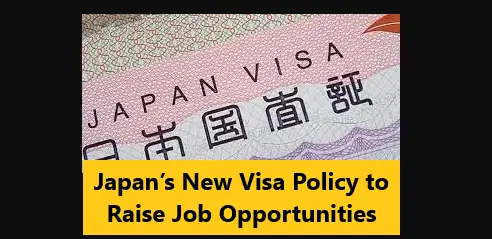Japan’s New Visa Policy to Raise Job Opportunities.
Japan Opens Doors for International Students: New Visa Policy Aims to Address Labor Shortages
Japan, renowned for its strong work ethic and culture of dedication, is facing a demographic challenge – a shrinking young workforce.
Read More: Italy Launched Visa Service Operations in Lahore
To address this labor shortage, particularly in skill-specific industries, the country is implementing a new visa policy targeted at attracting and retaining international talent.
This policy focuses on international students, offering them an exciting pathway to build successful careers in Japan.
Understanding the Shortage and the Solution
- Shrinking Workforce: Japan’s population is aging rapidly, leading to a dwindling pool of young workers. This presents a significant challenge for various industries seeking skilled individuals.
- Foreign Workers as a Bridge: The influx of skilled foreign workers can help bridge this gap and ensure the smooth operation of key sectors.
- Focus on International Students: Recognizing the potential of international students who develop valuable skills and language proficiency during their studies, Japan is making it easier for them to find employment after graduation.
The New Visa Policy: A Boon for International Students
The revised visa regulations address a crucial need for international students who previously faced limitations despite possessing relevant skills and Japanese language abilities.
Here’s how the new policy empowers them:
- Employment Opportunities: Previously, international students graduating from state-designated technical schools often had to return to their home countries due to limited job opportunities aligned with their qualifications. The new policy expands their options by allowing them to work in a wider range of professions.
- Designated Activities Visa Eligibility: The Japanese government has adjusted the eligibility criteria for the designated activities visa. This visa now caters to students with advanced Japanese language skills and educational achievements comparable to a bachelor’s degree. This extended eligibility allows them to stay in Japan and pursue employment opportunities.
Benefits for Japan and International Students
- Filling the Labor Gap: The new visa policy acts as a catalyst for attracting a highly skilled international workforce. This influx of talent helps address Japan’s labor shortages and injects fresh perspectives and expertise into various industries.
- Career Opportunities for Students: International students gain the chance to build successful careers in Japan by leveraging their newly acquired skills and language proficiency. This opens doors to exciting professional opportunities and growth within the Japanese market.
Planning Your Studies in Japan: A Guide
Considering pursuing your studies in Japan? Here’s a breakdown of key aspects to consider:
Education System:
- Course Duration: Bachelor’s programs typically last four years, while master’s programs are two years.
- Entry Requirements: A high school diploma is needed for bachelor’s programs, while a bachelor’s degree is required for master’s programs.
- Language Requirements: English and Japanese are the primary languages of instruction. However, some universities might require IELTS or TOEFL scores for specific programs. Several universities might also have their own entrance exams.
- Cost: Average tuition fees range from $5,000 to $15,000 per year.
- Scholarships: Scholarships are available subject to eligibility and university-specific criteria.
Work Permit and Visa:
- Part-time Work: Students can work part-time for up to 20 hours per week during semesters and full-time during vacations.
- Post-Study Work Permit: A post-study work permit allows international students to work in Japan after graduation.
- Visa Application:
- Embassy Location: Ramna 5 Diplomatic Enclave, Islamabad, Pakistan
- Bank Statements: Required with a minimum balance of $18,546.
- Processing Time: Allow several months for application processing and 1-3 months for visa processing.
By implementing this new visa policy, Japan is taking a strategic step towards a future with a diverse and skilled workforce.
International students seeking a dynamic and rewarding career path can now leverage this opportunity to embark on a successful journey in Japan.
Note: The information above might not be accepted 100%. Please verify from your own sources. We will not be responsible for any kind of loss due to our content.
For more news, please visit Munafa Marketing.




